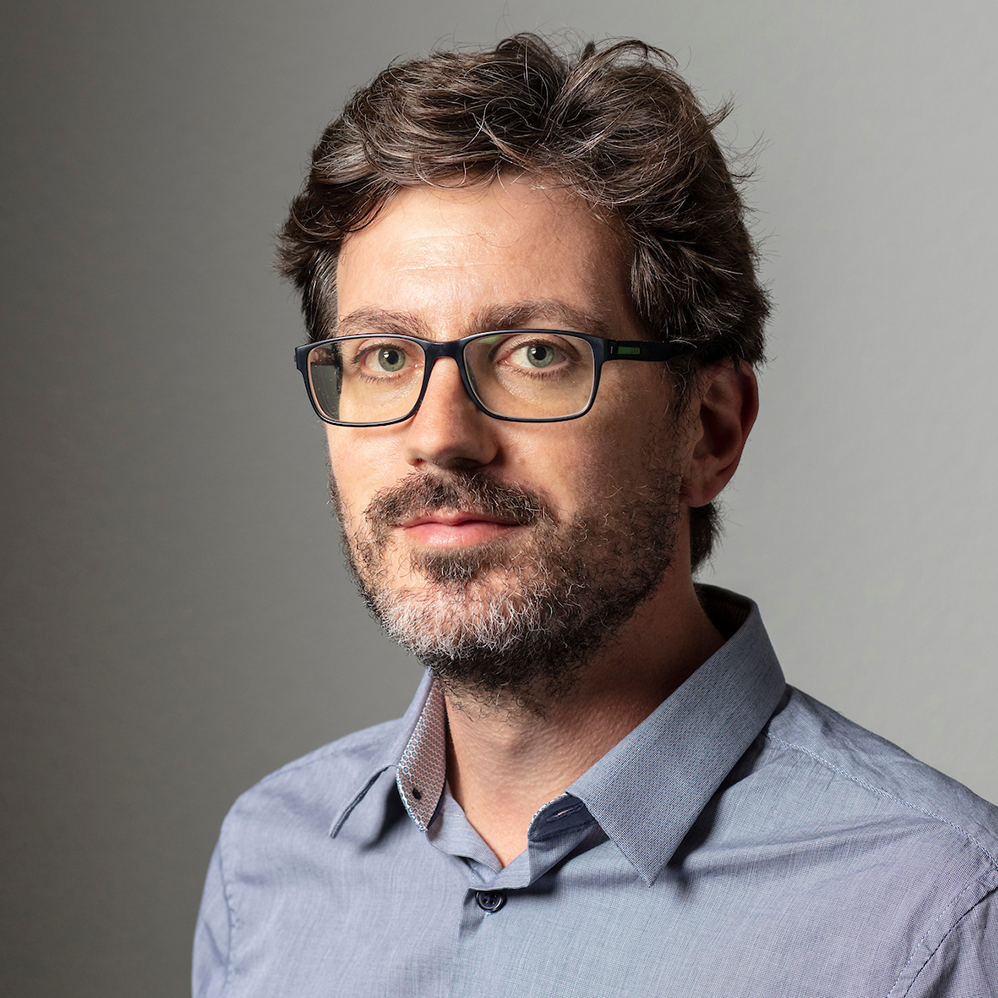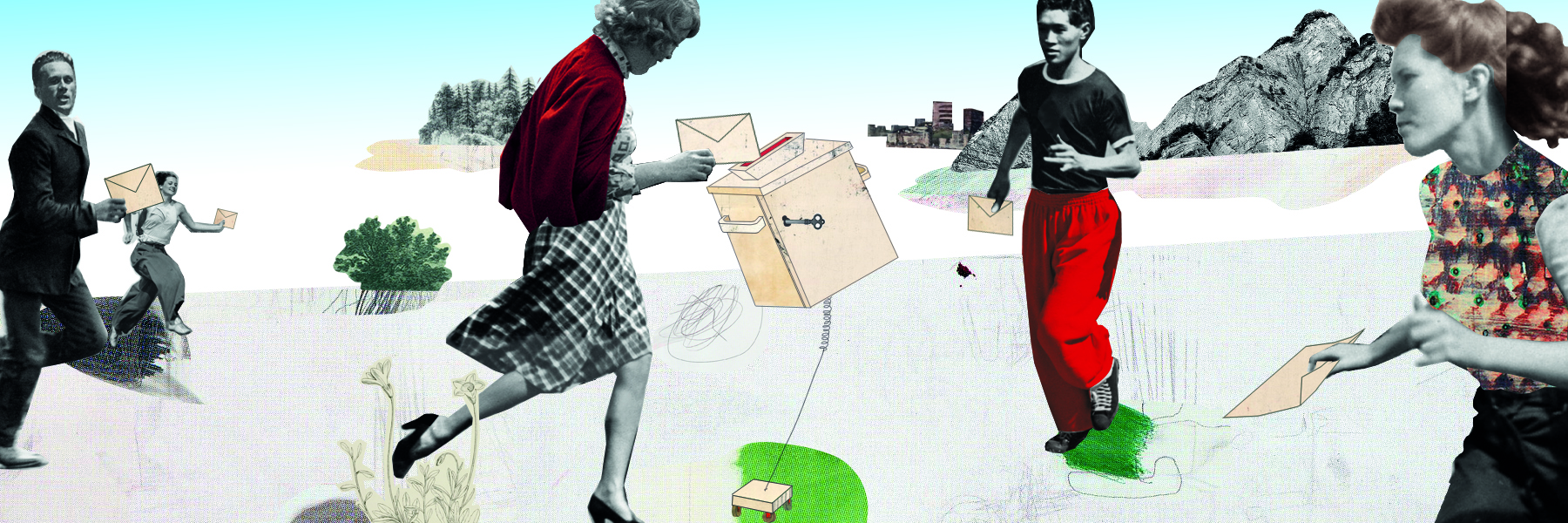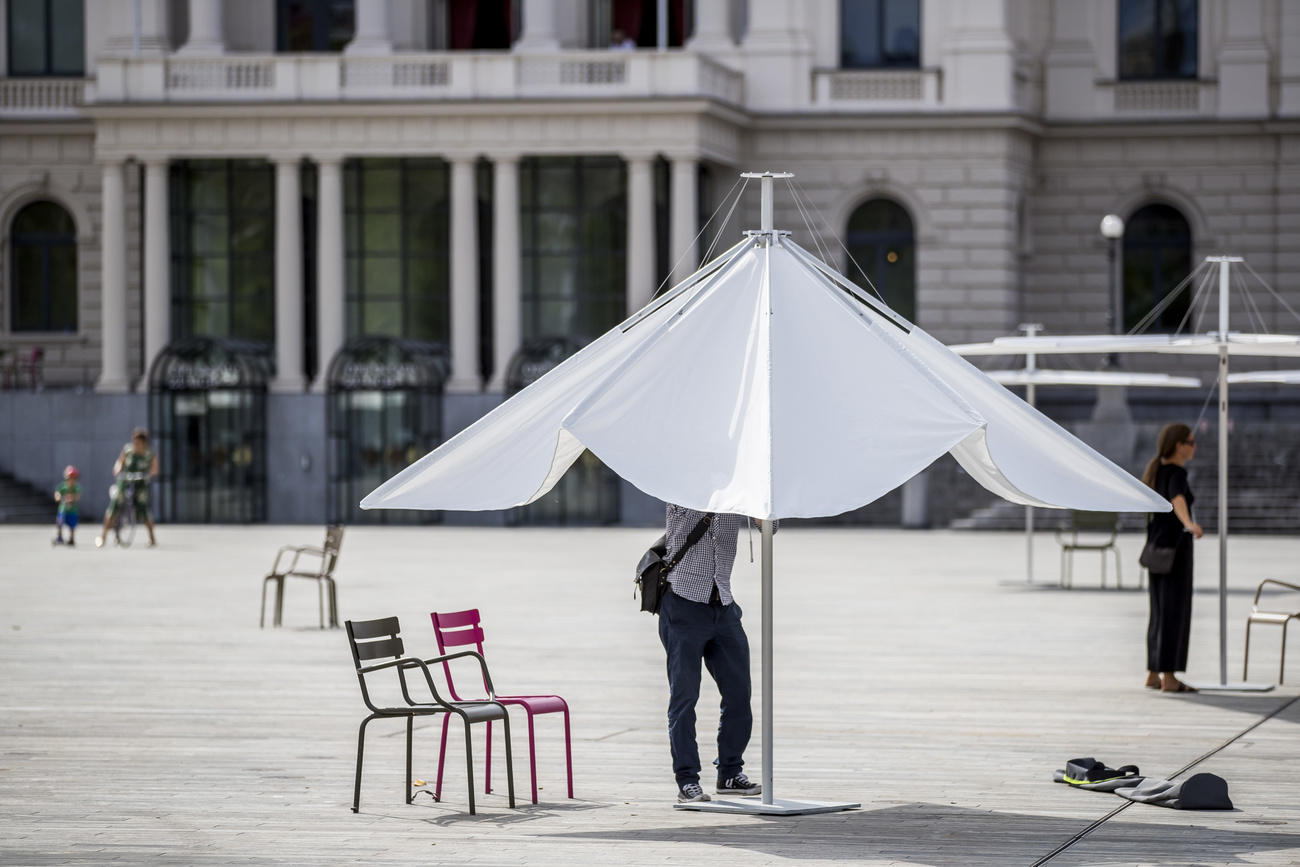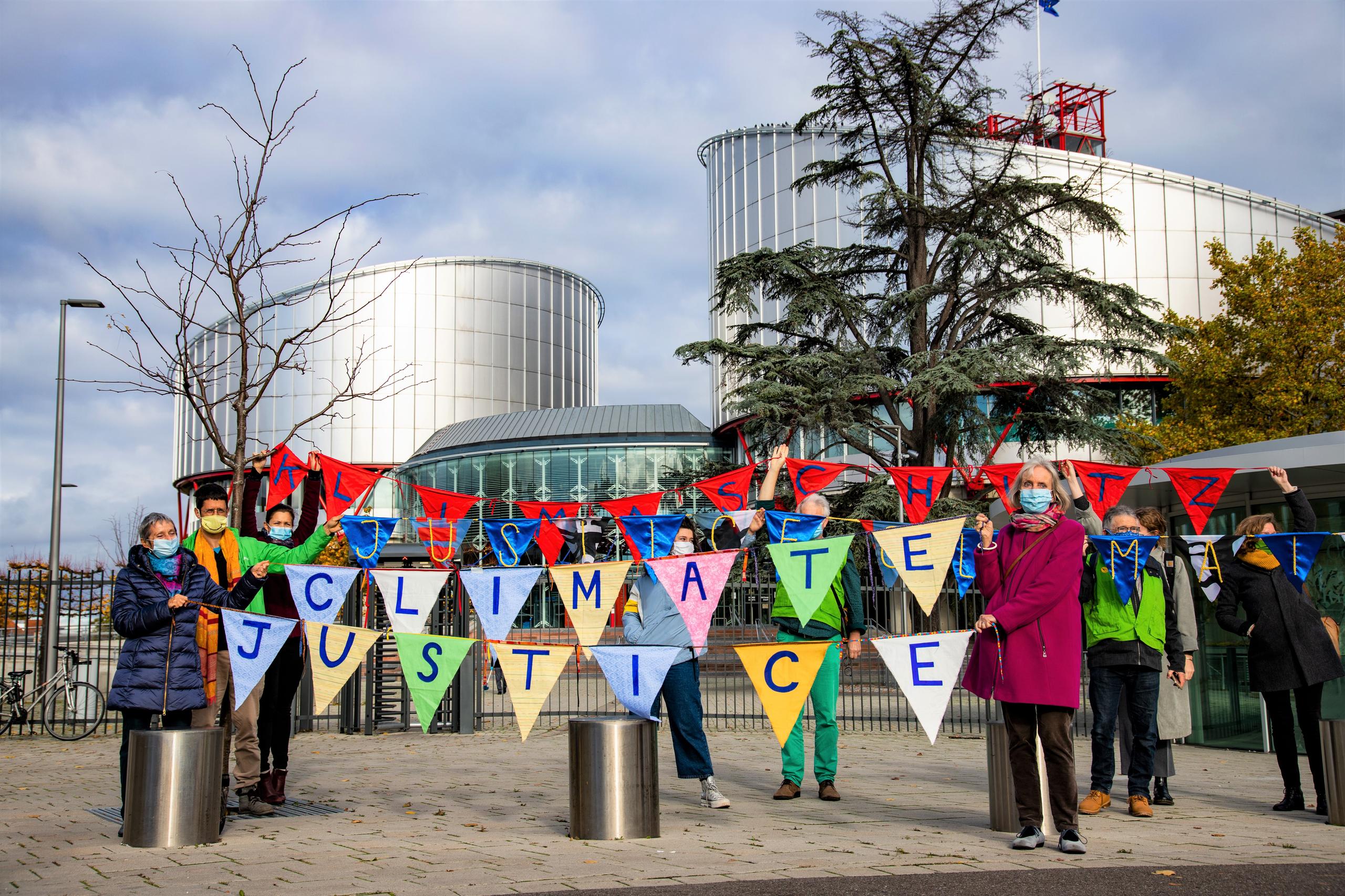Climate protection set in law: Do we need more or fewer regulations?
Switzerland should be climate neutral by 2050. In other words, by 2050 Switzerland should achieve a net-zero emissions balance. This is the aim of a new law that will be put to the vote on June 18, 2023.
In general, do you think that effective climate protection can be steered by the state legislation? How much regulation do you think would be necessary for the state to have effective policies on climate protection?
Or, alternatively, do you think that a liberal model based on individual responsibility would be more effective? If so, how would this have to be designed?
Click here for an overview of the proposed climate law:
From the article Swiss voters to decide on country’s energy transition
I'm not sure I can comply with any law that forces me to stop breathing by 2050. Net-zero means net-zero.
Questions my daughter live in aigle all kind of containers for glass cardboard and absolutely none for plastics?? Plastic it's the most problematic to recycle and no one knows where to send
“More jet-powered fun: don’t try this at home.”
https://www.swissinfo.ch/eng/switzerland-today/48759798
The man is lucky he survived, and hopefully not too badly damaged, even though he is to face legal proceedings.
Totally off topic, but this reminds me of the happy times when I was working at the HUG and we prepared a leaving party for a popular young intern. We included a few gifts and practical jokes for him.
One of my small contributions was to fill in a medical history form several pages long with several silly answers. . For male patients one of the questions asked is “la puissance de jet” to evaluate renal function. I filled this in with “la puissance de jet d’eau de Genève” whose figure I had verified on the phone with the tourist office in the days long before the Internet. I also took delight in filling in the diagrams of a human body, back and front view, with a pin striped suit, collar and tie, bowler hat and all the other very British accoutrements intended to amuse my non-British colleague. I also dotted face and hands with red dots so the figure didn’t look too healthy!
20 years ago terrorism was the enemy, nowadays climate change is the new enemy.
As someone mentioned in another comment, those who make decisions are not necessarily the right people or have the knowledge to say what is right or wrong.
I chose to use public transportation instead of having a car, first of all because I don't really need it, second of all because t works very well in Switzerland (compared to other countries). But I am the one bombarded by the media on giving up on this or giving up on that.
How about companies? They went from gas cars to electric ones just to make more profit. Do they really think people don't understand where electricity comes from? We all know about the huge impact of the batteries. Instead, cows are to blame.
How about those leaders blaming overpopulation but they have seven kids of their own?
The worse is that journalists are not exactly working to clarify things. but pushing the narrative in one direction instead.
Before talking about regulations we should talk about transparency.
Dear SuzieQ, good to see you setting a good example!
The topic is not always easy to cover from a journalistic point of view, you are right, especially since political decisions never satisfy everyone - for some they go too far, for others not far enough.
But I do have one objection to your criticism: the scientific consensus on dramatic effects of climate change is overwhelming. To accuse the media of "steering a narrative" is unfair in this sense. To stick with the example of cows: They make up a vanishingly small percentage of climate coverage, but are readily mentioned to show that the media "has an agenda." If you browse a bit on our site, you will see that we have written significantly more on climate change :)
Kind regards
G. Mavris
Liebe SuzieQ, schön, dass Sie mit gutem Beispiel vorangehen!
Das Thema ist aus journalistischer Sicht nicht immer einfach abzudecken, da haben Sie Recht, vor allem da die politischen Entscheidungen nie alle zufriedenstellen – den Einen gehen sie zu weit, den Anderen zu wenig weit.
Aber einen Einwand gegen Ihre Kritik habe ich: Der wissenschaftliche Konsens über dramatische Auswirkungen des Klimawandels ist überwältigend. Den Medien vorzuwerfen, dass sie "ein Narrativ lenken", ist in diesem Sinn unfair. Um beim Beispiel der Kühe zu bleiben: Die machen in der Klimaberichterstattung einen verschwindend geringen Anteil aus, werden aber gerne erwähnt, um zu zeigen, dass die Medien "eine Agenda" hätten. Wenn Sie bei uns ein wenig stöbern, werden Sie sehen, dass wir bedeutend mehr zum Thema Klimawandel geschrieben haben :)
Freundliche Grüsse
G. Mavris
read
who adapted the number of their population to the resources of their valleys
and not
who adapted the name of their population to the resources of their valleys
Thank you
lire
qui adaptait le nombre de leur population aux ressources de leur vallées
et non
qui adaptait le nom de leur population aux ressources de leur vallées
Merci
I read in your article
"It's impossible to claim energy neutrality while remaining on the growth model, i.e., continuing to increase the population, increasing the wealth of all, maintaining an education and health system for increasingly expensive treatments, due essentially to diseases of civilization, betting on Asian tourism with crazy solutions like the latest cable car on the Matterhorn".
That's exactly what I think, and what ancient Himalayan populations already knew, adapting the names of their people to the resources of their valleys in a very interesting way!
This is exactly what the SVP's initiative is all about, and of course many will once again demonize it.
I hope that Elena Lacroix and her fellow journalists will vote in favor of the initiative so that Switzerland doesn't become a Singapore to the power of 3 or 5, eventually of course!
It's up to the state to have a vision and impose goals and constraints, it's up to the private sector to adapt and find solutions!
The shortage of personnel in Switzerland is not an argument, everyone is already crying out in fear of Chatgpt and its ilk!
We have every right except to be contradictory, as you know!
I could go on, but I'll leave it at that!
Je lis dans votre article
" Il est impossible de prétendre à une neutralité énergétique tout en restant sur le modèle croissance, à savoir, continuer à augmenter la population, accroître la richesse de tous, maintenir un système d'éducation et de santé pour des traitements de plus en plus couteux, dus essentiellement aux maladies de civilisation, miser sur un tourisme asiatique avec des solutions démentes comme le dernier téléphérique sur le Cervin"
C'est exactement ce que je pense et ce que savait déjà d'ancienne population dans l'Himalaya qui adaptait le nom de leur population aux ressources de leur vallées d'une façon par ailleurs très intéressante !
C'est exactement ce que. veut l'initiative de l'UDC, que beaucoup vont évidemment encore une fois diaboliser
J'espère que Elena Lacroix et ses collègues journalistes vont voter en faveur de l'initiative pour que la Suisse ne devienne pas un Singapour à la puissance 3 ou 5, a terme évidemment!
C'est le fait de l'Etat d'avoir une vision et d'imposer des buts et des contraintes., c'est le fait de l'économie privé de s'adapter et de trouver des solutions.!
L'argument du manque de personnel en Suisse n'est pas un, tout le monde pleurent déjà de peur de Chatgpt et ses similaires!
On a tous les droits sauf celui d'être contradictoire, comme vous le savez!
Je pourrai continuer, mais j'en reste là!
The fundamental problem is the attachment of our so-called developed countries to an economic model based on exactly the opposite of the goal sought by the law: balance sheet neutrality. It's impossible to claim to be energy-neutral while remaining on the growth model, i.e., continuing to increase the population, increasing the wealth of all, maintaining an education and healthcare system for increasingly expensive treatments, essentially due to diseases of civilization, banking on Asian tourism with insane solutions like the latest cable car on the Matterhorn... in short, a total contradiction and incoherence with regard to the consequences of climate change.
During the last war, we learned to do without almost everything. To save every last bit of our daily needs, to reduce our food consumption. There is no other solution.
It's fortunate that this law has been passed, but we still need to radically change all the criteria that have governed our economy until now. Otherwise, it's all smoke and mirrors, and no results - in other words, straight to the wall.
Le problème de fond est l'attachement de nos pays dits développés à un modèle économique fondé sur exactement le contraire du but recherché par la loi, le bilan neutre. Il est impossible de prétendre à une neutralité énergétique tout en restant sur le modèle croissance, à savoir, continuer à augmenter la population, accroître la richesse de tous, maintenir un système d'éducation et de santé pour des traitements de plus en plus couteux, dus essentiellement aux maladies de civilisation, miser sur un tourisme asiatique avec des solutions démentes comme le dernier téléphérique sur le Cervin ... bref une contradiction et incohérence totales au regard des conséquences du changement climatique.
Pendant la dernière guerre nous avons appris à nous passer de tout ou presque. A économiser le moindre bout de tous les besoins quotidiens, à réduire notre consommation alimentaire. Il n'y a pas d'autre solution.
Il est fort heureux que cette loi ait été votée, encore faut il changer radicalement tous les critères qui ont régi notre économie jusqu'à présent. Sinon c'est de la poudre aux yeux et un résultat nul autrement dit, droit dans le mur.
I find it quite comical.....how can a country or any place on this earth become "climate neutral?" What's that supposed to mean? It's as if world leaders and administrations i.e. alphabet agencies are caught in a matrix due to technology and actually believe that they can "remake the world." God's work isn't good enough I guess.
For example, many times during marketing, electric vehicles are promoted as the "solution to fossil fuel dependency" and will introduce a period of sustainability. Nonetheless, these advertisements have no genuine basis and are simply "a dream of companies of what they want reality to be like."
The battery size of EVs are huge. They require a lot more rare earth components and these materials require tons of C02 to mine and produce. In addition, automobiles need a crazy amount of infrastructure to function properly.
How are people going to charge-up these cars? Where? When these huge batteries combust (and yes it has happened with cars, buses, and even bicycles) unexpectedly. the fires are so intense they can't be put out. They have to just let them burn out. So we're going to be driving on the highway and if an electric vehicle bursts suddenly we're going to consider that "the new normal?" And if you don't believe me look up the information for yourself. Yes I know, "everything on the internet isn't true" being. However, even the best scholars and doctors go online to gather information. You just need to know how and where to search and have an unbiased discerning eye.
What about food? Do they seriously believe that we can live off eating bugs while they (our oligarchs) eat the best steaks? How is that helping the climate?
Do we need more or less regulations? Neither.....and how do you make a "law" about the climate? LOL Our leaders have gone insane and not making sense because it's all about controlling the populace. Sure, we should pickup our trash, use less plastic, stop polluting the water (which it's the companies that's doing most of the polluting 97.9999% of the time but they want to regulate the common people) and my goodness I wish companies would use less packaging when sending items ordered online. So you see....even ordering online is not foolproof. I've had to nearly use an electric tool just to get a package open!
I think they've gone too far and we need to put "sane" critical thinking, reasonable, realistic people who truly "care" about this world in office because if those who are in office now have their way.....we won't have any earth left!
Putting "sane" and NOT corrupt people in power!
Mettre au pouvoir des personnes « saines d’esprit » et NON Corrompues !
Rather less, so that water, wind, for power generation can finally be used without delay.
Lieber weniger, damit Wasser, Wind, fuer Stromerzeugung endlich und ohne Verzögerung genutzt werden kann.
In my opinion, when a person buys an electric car and thinks he is contributing to solving climate problems, he is missing the point. Keep in mind that Antonino Zichichi said that we , as humanity, have very little influence on climate problems.
A mio parere, quando una persona acquista un'auto elettrica e pensa di contribuire alla risoluzione dei problemi climatici, non ha capito niente. Tenga presente che Antonino Zichichi ha detto che noi , come umanità, influiamo pochissimo sui problemi climatici.
It is absolutely clear that we as mankind have caused the CO2 problem and therefore have to solve it. It would be nice if people would be reasonable and make a voluntary contribution. I myself have long had a PV system on the roof, heat pump in the basement and an electric car. Thus I have only 1/3 of the energy costs and can make a substantial contribution to a positive future. Unfortunately, however, I am still in the minority and I have come to the realization that it is probably not enough only with voluntary contributions. To reach the masses, we need obligations and promotion. That is better than bans. In my view, the next step would be to make solar mandatory for new buildings and roof renovations. The additional costs are in the single-digit percentage range and after approx. 10 years one even earns money with it. Ecologically, such panels are amortized after 1-2 years.
Es ist völlig klar, dass wir als Menschheit das CO2-Problem verursacht haben und es deshalb auch lösen müssen. Es wäre schön, wenn die Menschen einsichtig wären und freiwillig einen Beitrag leisten würden. Ich selbst habe schon lange eine PV-Anlage auf dem Dach, Wärmepumpe im Keller und ein Elektromobil. Damit habe ich nur noch 1/3 der Energiekosten und kann einen wesentlichen Beitrag leisten an eine positive Zukunft. Leider bin ich jedoch immer noch in der Minderheit und ich bin zur Einsicht gekommen, dass es nur mit freiwilligen Beiträgen wohl nicht reicht. Um die Masse zu erreichen, brauchen wir Pflichten und Förderung. Das ist besser als Verbote. Der nächste Schritt wäre aus meiner Sicht eine Solarpflicht für Neubauten und Dachsanierungen. Die Mehrkosten sind im einstelligen Prozentbereich und nach ca. 10 Jahren verdient man sogar Geld damit. Ökologisch sind solche Panels übrigens nach 1-2 Jahren amortisiert.
Many who have no technical knowledge talk about the emission of carbon.
Pure carbon exists in the form of diamonds and graphite. The is no emission of carbon. (could be helpful if I could emit some diamonds)
Humans take in as food organic compounds that include carbon, oxygen, nitrogen and hydrogen in molecular chains. Some of the carbon is utilised as energy and to grow body parts and organs. Some CO2 (about 3.8%) is expelled in every breath.
There is a trace amount of CO2 in the atmosphere (about 420ppm) and this has been put there from various sources such as emissions from oceans during summer and warm oceans near the equator, volcanoes and wild fires (bushfires in Australia). There is evidence that in the past CO2 in the atmosphere was much higher (eg when coal was deposited) and even likely in Roman and Viking times (when Greenland was green) . There is no evidence that CO2 emission is harmful, therefore it should not be regulated.
Excellent contribution! The solution to this issue is to rely on private ownership, individual responsibility and the free market. Instead of relying on government, individuals and businesses will make sustainable decisions driven by economic incentives and market demand
Excelente contribución! La solución a este tema es basarnos en la propiedad privada, la responsabilidad individual y el libre mercado. En lugar de depender del gobierno, las personas y las empresas tomarán decisiones sostenibles impulsadas por incentivos económicos y la demanda del mercado
I am a registered professional engineer (chemical) in Queensland Australia which has a law (Professional Engineers Act Qld.) and requires anyone providing a engineering service to be registered. I have BE(Chem) from a world recognised university and also a MBA degree from another University. I have decades of experience in the engineering subjects of thermodynamics and Heat&Mass transfer.
In my view no government or government officials who mostly have no technical qualifications or experience should be making decisions about energy usage or the source of energy. There is now ample evidence that scientists in the medical field have given bad advice which has harmed individuals as well as the prosperity of countries. The public should not assume that there has been good advice from scientists (who have no knowledge of the engineering subjects above). There much evidence that CO2 is necessary for plant growth and supply food for all animals including humans. There is no evidence since about 1850 that CO2 has any harmful effect especially with temperature.
How do you expect politicians and civil servants to understand anything? They've never worked before and have never been confronted with industrial, scientific and economic life!
Comment voulez-vous que les politiciens et les fonctionnaires comprennent quelque chose ils n’ont encore jamais travailler et n’ont jamais été confrontés à la vie industrielle, scientifique et économique !
It appears that we have the cart before the horse. I believe we need to see scientific data from more than one location that verifies the climate issue. Then a fix agreed upon by scientists must be proposed. Only then can we think about legislating our ways out of the problem. A trial and error method can be very costly to the tax payer.
Yes, we need state control in the first place... Our liberal societies are too diversified to allow free choice. This is a recurring problem that could lead to conflicts between private individuals, towns, cantons and nations.
WE NEED TO BE AWARE OF THIS .....
Oui il faut un controle etatique en 1er lieu... Nos societees liberales sont trop diversifiees pour laisser un libre choix. Le probleme est recurrent et pourrait generer des conflits entre prives villes cantons et nations.
NOUS DEVONS EN AVOIR CONSCIENCE .....
In a liberal-democratic society, the liberal society elects the parliament and the government and thus, as a rule, a liberal state. How should state controls be of any use if the state itself is liberal?
Besides, what exactly is the problem with being liberal?
And what are the causes of conflicts between people, cities, cantons and nations?
In einer liberal-demokratischen Gesellschaft wählt die liberale Gesellschaft das Parlament und die Regierung und somit in der Regel eine liberalen Staat. Wie sollten da staatliche Kontrollen etwas bringen wenn der Staat selbst liberal ist?
Nebenbei, was genau ist das Problem am Liberal sein?
Und was sind die Ursachen für Konflikte zwischen Menschen, Städten, Kantone und Nationen?
(3) What is frightening about global warming is that some people always refer to science and scientific findings. With this argumentation allegedly already Stalin had pushed through some heartless changes instead of critically discussing the data collection, calculation methods and models in public discussions as it belonged to a good science in former times. Real science does not shy away from transparency.
In the sense:
How much CO2 does the production and transport of solar cells and wind turbines produce?
How much energy do the so-called negative emission technologies(? Art. 1 para. a ) need and where should the energy come from?
How many square kilometers of forest are needed for net zero in a 12 million Switzerland and where should this be located next to the solar cells and wind turbines?
(3) Beängstigend beim Thema Klimaerwärmung ist, dass somanche immer auf die Wissenschaft und Wissenschaftliche Erkenntnisse verweisen. Mit dieser Argumentation hatte angeblich schon Stalin somanche herzlose Veränderung durchgedrückt anstelle in öffentlichen Diskussionen die Datenerfassung, Berechnungsmethoden und Modelle kritisch zu diskutieren wie es sich früher für eine gute Wissenschaft gehörte. Echte Wissenschaft scheut nicht die Transparenz.
In dem Sinne:
Wieviel CO2 produziert das Herstellen und der Transport von Solarzellen und Windräder?
Wieviel Energie brauchen die sogenannten Negativemissionstechnologien(? Art. 1 Abs. a ) und woher sollte die Energie kommen?
Wieviele Quadratkilometer Wald braucht man für Netto Null bei einer 12 Millionen Schweiz und wo soll dieser neben den Solarzellen und Windräder stehen?
(2) On the other hand, today one pretends to be a democracy and in which consequently each and everyone counts equally and each voice has the same weight. Accordingly, in civil society, those who have knowledge or power should not simply determine how the ignorant have to live and thus abolish democracy. Not to mention a de facto abolition of the "dignity of man". If factual arguments have no effect, hasn't civil society failed in another area? In the sense in a democracy also the administration may have to live the humans no regulation some like it/he as long as not body and life of humans and/or the common state will is endangered. In former times the administration could control the price and thus consumption of products with the goods turnover tax without prohibiting these. Unfortunately, this instrument was given out of hand with the introduction of the VAT in question. And now, in addition to the energy law, there should be a climate law as an isolated solution?
(2) Auf der anderen Seite gibt man heute vor eine Demokratie zu sein und in der folglich jede und jeder gleich viel zählt und jede Stimme das selbe Gewicht hat. Dem entsprechend dürften in der Zivilgesellschaft eigentlich diejenigen, welche Wissen oder Macht haben, nicht einfach über die Unwissenden bestimmen wie sie zu leben haben und somit die Demokratie abschaffen. Von einem de facto Abschaffen der «Würde des Menschen» ganz zu schweigen. Wenn sachliche Argumente nichts bewirken, hat dann die Zivilgesellschaft nicht in einem anderen Bereich versagt? In dem Sinne dürfte in einer Demokratie auch die Verwaltung den Menschen keine Vorschrift manchen wie sie/er zu leben haben solange nicht Leib und Leben von Menschen und/oder der gemeinsame Staatswille gefährdet wird. Früher konnte die Verwaltung mit der Warenumsatzsteuer den Preis und somit Konsum von Produkten steuern ohne diese zu verbieten. Dieses Instrument hat man leider mit der Einführung der fraglichen Mehrwertsteuer aus der Hand gegeben. Und nun sollte es neben dem Energie-Gesetzt als eine Insellösung ein Klimagesetz geben?
Self-responsibility, without a spark of charity on a mental level and thus also consideration, obviously leads to the fact that the weakest, who can defend themselves the least, as in an ego society for the apparently stronger ones like e.g. tyrants become fair game for tormenting like bullying, slandering, computer hacking to deposit false evidence, identity theft etc. and thus to ruin them and/or make them dependent on themselves. Afterwards the next weaker ones are at the row and so on until a tyrant has destroyed all or has made dependent on itself. One could abolish there just as well equal the democracy, the penal code and on grounds of the missing common state will the state. Particularly, why should fraud, maltreatment or murder still be punishable if then finally each victim would be to blame in the sense of the so-called personal responsibility?
Who may remember here still the good old times, when it was said, "everyone carries a step far also responsibility for the humans, with whom he/she interacts, in particular those carry joint responsibility for humans, who have knowledge and/or power"? And shouldn't this also apply a step wide between states, especially between neighbors?
Eigenverantwortung, ohne einen Funken Nächstenliebe auf mentaler Ebene und somit auch Rücksichtnahme, führt naheliegender Weise dazu, dass die Schwächsten, die sich am wenigsten wehren können, wie in einer Ego-Gesellschaft für die anscheinend Stärkere wie z.B. Tyrannen zu Freiwild werden für Quälereien wie Mobbing, Verleumdungen, Computer Hacken um falsche Beweise zu hinterlegen, Identitätsdiebstahl usw. und sie somit zu Grunde zu richten und/oder von sich abhängig zu machen. Danach sind die nächst Schwächeren an der Reihe und so weiter bis ein Tyrann alle zerstört oder von sich abhängig gemacht hat. Man könnte da eben so gut gleich die Demokratie, das Strafgesetzbuch und auf Grund des fehlenden gemeinsamen Staatswillen den Staat abschaffen. Zumal, wozu sollte Betrug, Misshandlung oder Mord noch strafbar sein wenn dann letztendlich jedes Opfer im Sinne der sogenannten Eigenverantwortung selber Schuld wäre?
Wer mag sich hier noch an die guten Alten Zeiten erinnern, als es hiess, «jeder trägt einen Schritt weit auch Verantwortung für die Menschen, mit denen er/sie interagiert, insbesondere tragen diejenigen Mitverantwortung für Menschen, die Wissen und/oder Macht haben»? Und sollte dies nicht auch einen Schritt weit zwischen Staaten gelten, insbesondere zwischen Nachbarn?
The first step is to educate the entire population to conserve this vital resource. There are a thousand and one ways in which every town and city can be vigilant in its use. More than regulations, schools and the entire education system are on the front line: a generalized sense of responsibility.
The second is the use of water in all human activities, starting with agriculture, livestock breeding and above all industry, not to mention rampant urbanization, which is an ecological aberration. Sector by sector, studying each stage of its use, and only after regulations have been drawn up in consultation with trade unions, contractors and major groups.
La première mesure est l'éducation de la totalité de la population à la sobriété et l'économie de cette ressource vitale. Il y a mille et une manière dans chaque commune, dans chaque ville d'être vigilant dans son utilisation. Plus qu'une règlementation les écoles, et tout le système éducatif sont en première ligne : une responsabilisation généralisée.
La deuxième est l'utilisation de l'eau dans toutes les activités humaines, à commencer par l'agriculture, l'élevage et surtout l'industrie, sans parler de l'urbanisation galopante qui est une aberration écologique. Secteur par secteur, à étudier chaque étape de son utilisation et seulement après une règlementation en concertation avec les syndicats, les entrepreneurs, les grands groupes.
According to the research of the Swiss National Fund, neither a state-led nor a liberal model is a sensible way forward. In its research, the National Fund basically examines three state options: prescribing, promoting and steering. Steering by means of steering levies is definitely a liberal model. Moreover, the National Fund shows that steering is 5 times more effective than prescribing and promoting. In short, the question is already wrongly posed and does not lead to a sensible solution. In addition, there are currently no political and media majorities to be found that are in favor of steering. Obviously, people love to squabble and not to find solutions.
Gemäss den Forschungen des Schweizer Nationafond ist weder ein staatlich gelenktes noch ein liberales Modell ein sinvoller Weg. Der Nationalfond untersucht in seinen Forschungen grundsätzlich drei staatliche Möglichkeiten, Vorschreiben, Fördern und Lenken. Wobei lenken mittels Lenkungs-Abgaben durchaus ein liberales Modell ist. Zudem zeigt der Nationalfond, dass lenken 5 mal effektiver ist als Vorschreiben und Fördern. Kurzum die Frage ist schon falsch gestellt und führt damit auch nicht zu einer sinvollen Lösung. Hinzu kommt, dass zur Zeit keine politischen und medialen Mehrheiten zu finden sind, die sich für lenken einsetzen. Offensichtlich liebt man den Knatsch und keine Lösungen.





Join the conversation!